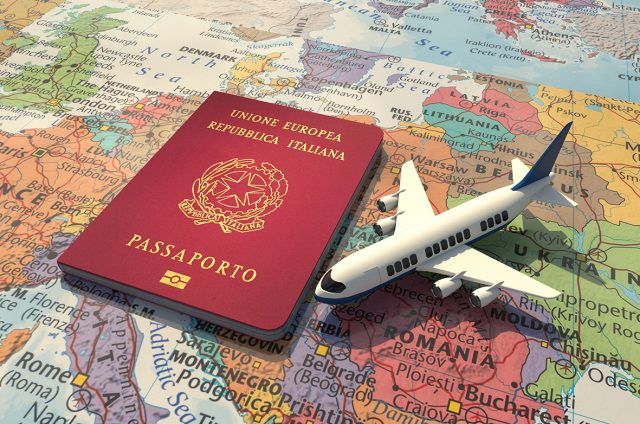
A New World Order of Mobility: Italy Rises to Fourth Place as the U.S. Falls to Twelfth in the Henley Passport Index
For the first time in two decades, the American passport no longer ranks among the world’s most powerful. According to the latest Henley Passport Index, published by Henley & Partners and based on data from the International Air Transport Association (IATA), the United States has slipped to twelfth place in the global ranking.
The fall marks a striking shift in global mobility and the dynamics of international influence. Once seen as the ultimate symbol of access and privilege, the U.S. passport now offers visa-free or visa-on-arrival entry to 180 destinations, the same as Malaysia — a notable decline from its position at the top of the list in 2014.
A Symbolic Decline in Soft Power
Christian Kaelin, chairman of Henley & Partners and one of the leading experts in global citizenship, describes the decline as “a fundamental change in global mobility and the dynamics of soft power.” In his view, countries that promote openness and collaboration are gaining new advantages in an increasingly interconnected world, while those that cling to outdated notions of exclusivity risk being left behind.
“The nations that embrace openness and cooperation are making huge strides,” Kaelin observed, “while those holding on to the privileges of the past are being left behind.”
The fall of the United States in the rankings reflects more than just bureaucratic barriers — it symbolizes a deeper transformation in how nations project their influence and engage with the rest of the world.
The Trump Administration’s Lasting Impact
The report identifies U.S. immigration and foreign policy, particularly under the Trump administration, as one of the main factors behind America’s diminished passport power. During Trump’s presidency, the Department of State launched a large-scale review of documentation for more than 55 million visa holders, part of a broader tightening of immigration controls. This policy shift, aimed at strengthening border security, had the unintended consequence of reducing international reciprocity — as other nations responded by tightening entry requirements for Americans.
Although subsequent administrations have sought to repair diplomatic ties and restore mobility, the effects of those years remain visible in today’s data. Analysts at Henley & Partners suggest that rebuilding lost trust and openness may take years, if not decades.
Italy’s Rise in Global Mobility
While the United States experiences decline, Italy has emerged as one of the standout performers in the 2025 ranking. The Italian passport now ranks fourth in the world, granting visa-free or visa-on-arrival access to 188 countries. Italy’s strong showing reflects both its stable diplomatic relationships and its commitment to international engagement. In recent years, Rome has expanded bilateral agreements and strengthened cooperation within the European Union and beyond, ensuring its citizens enjoy one of the most mobile passports on the planet.
The Global Leaders: Singapore, South Korea, and Japan
At the top of the Henley Passport Index are three Asian nations that continue to dominate global mobility rankings. Singapore leads the world, with access to 193 destinations, followed closely by South Korea (190) and Japan (189). These countries’ high rankings reflect decades of diplomatic stability, strong international partnerships, and proactive foreign policies that prioritize travel freedom for their citizens. Their performance underscores a broader trend: the center of global mobility — and, by extension, influence — has shifted eastward.
A Changing Map of Global Mobility
The evolving passport hierarchy mirrors larger shifts in global power. The dominance once held by Western nations — particularly the United States and parts of Europe — is gradually being replaced by a more balanced and competitive landscape. Nations that emphasize diplomacy, trade partnerships, and openness to migration are increasingly rewarded with greater travel freedom for their citizens. In contrast, isolationist tendencies, restrictive visa policies, and inward-focused politics tend to limit a nation’s global reach.
Beyond Travel: Passports as Symbols of Global Influence
While the Henley Passport Index primarily measures mobility, its implications reach far beyond tourism or business travel. A passport’s strength is also a reflection of a country’s soft power — its ability to attract, persuade, and collaborate on the world stage.
In this sense, Italy’s rise and America’s decline tell two very different stories about national influence in the 21st century. Italy’s open, multilateral approach aligns with the values of a globalized world, while the United States, still powerful but increasingly constrained, faces the challenge of redefining its global role in an era where mobility equals influence.
A Passport to the Future
As the world continues to navigate the balance between security and openness, the Henley Passport Index serves as a reminder that global mobility is not just a privilege — it is a barometer of diplomacy, trust, and cooperation. With Italy climbing and the United States falling, the latest ranking highlights a simple truth: in today’s interconnected world, the nations that build bridges — not barriers — are the ones that move forward.



 Subscribe
Subscribe